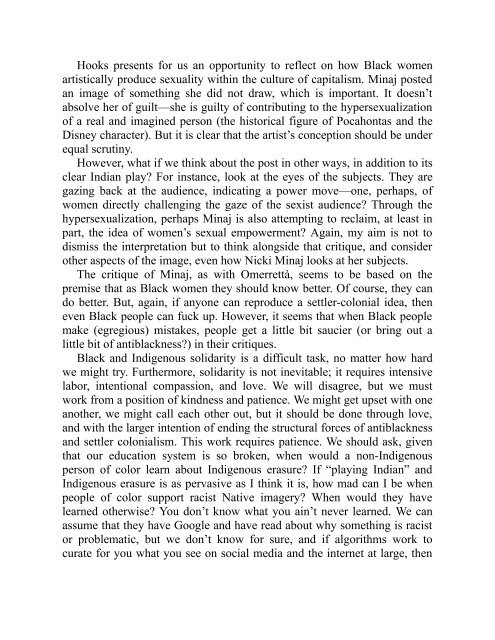Create successful ePaper yourself
Turn your PDF publications into a flip-book with our unique Google optimized e-Paper software.
Hooks presents for us an opportunity to reflect on how Black women<br />
artistically produce sexuality within <strong>the</strong> culture <strong>of</strong> capitalism. Minaj posted<br />
an image <strong>of</strong> something she did not draw, which is important. It doesn’t<br />
absolve her <strong>of</strong> guilt—she is guilty <strong>of</strong> contributing to <strong>the</strong> hypersexualization<br />
<strong>of</strong> a real and imagined person (<strong>the</strong> historical figure <strong>of</strong> Pocahontas and <strong>the</strong><br />
Disney character). But it is clear that <strong>the</strong> artist’s conception should be under<br />
equal scrutiny.<br />
However, what if we think about <strong>the</strong> post in o<strong>the</strong>r ways, in addition to its<br />
clear Indian play? For instance, look at <strong>the</strong> eyes <strong>of</strong> <strong>the</strong> subjects. They are<br />
gazing back at <strong>the</strong> audience, indicating a power move—one, perhaps, <strong>of</strong><br />
women directly challenging <strong>the</strong> gaze <strong>of</strong> <strong>the</strong> sexist audience? Through <strong>the</strong><br />
hypersexualization, perhaps Minaj is also attempting to reclaim, at least in<br />
part, <strong>the</strong> idea <strong>of</strong> women’s sexual empowerment? Again, my aim is not to<br />
dismiss <strong>the</strong> interpretation but to think alongside that critique, and consider<br />
o<strong>the</strong>r aspects <strong>of</strong> <strong>the</strong> image, even how Nicki Minaj looks at her subjects.<br />
The critique <strong>of</strong> Minaj, as with Omerrettà, seems to be based on <strong>the</strong><br />
premise that as Black women <strong>the</strong>y should know better. Of course, <strong>the</strong>y can<br />
do better. But, again, if anyone can reproduce a settler-colonial idea, <strong>the</strong>n<br />
even Black people can fuck up. However, it seems that when Black people<br />
make (egregious) mistakes, people get a little bit saucier (or bring out a<br />
little bit <strong>of</strong> antiblackness?) in <strong>the</strong>ir critiques.<br />
Black and <strong>Indigenous</strong> solidarity is a difficult task, no matter how hard<br />
we might try. Fur<strong>the</strong>rmore, solidarity is not inevitable; it requires intensive<br />
labor, intentional compassion, and love. We will disagree, but we must<br />
work from a position <strong>of</strong> kindness and patience. We might get upset with one<br />
ano<strong>the</strong>r, we might call each o<strong>the</strong>r out, but it should be done through love,<br />
and with <strong>the</strong> larger intention <strong>of</strong> ending <strong>the</strong> structural forces <strong>of</strong> antiblackness<br />
and settler colonialism. This work requires patience. We should ask, given<br />
that our education system is so broken, when would a non-<strong>Indigenous</strong><br />
person <strong>of</strong> color learn about <strong>Indigenous</strong> erasure? If “playing Indian” and<br />
<strong>Indigenous</strong> erasure is as pervasive as I think it is, how mad can I be when<br />
people <strong>of</strong> color support racist Native imagery? When would <strong>the</strong>y have<br />
learned o<strong>the</strong>rwise? You don’t know what you ain’t never learned. We can<br />
assume that <strong>the</strong>y have Google and have read about why something is racist<br />
or problematic, but we don’t know for sure, and if algorithms work to<br />
curate for you what you see on social media and <strong>the</strong> internet at large, <strong>the</strong>n


















